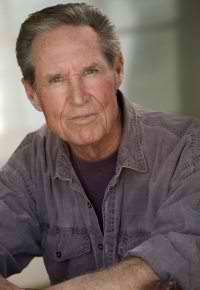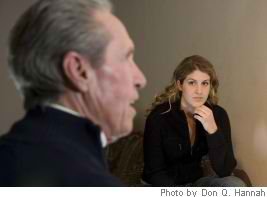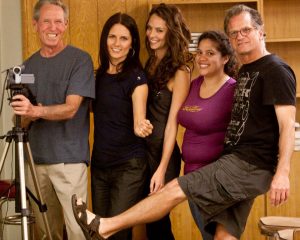Actor Peter Looney - Qualifications

“Peter’s patience insight, and confidence in his students, has enabled me to grow not only as an actor but as an individual.”
JULIA’S WORK HAS BEEN FEATURED ON VARIOUS PLATFORMS INCLUDING :
E!, PBS, AMAZON PRIME VIDEO, HULU, WV PUBLIC BROADCASTING, Apple TV, SIERRA CLUB, HGTV. HUFFPOST AND TEDX.
About Actor / Film Coach Peter Looney
Mr. Looney studied directly with Sanford Meisner. He was one of the few actors accepted into the Master Class taught by Charles Conrad without an audition. His direct association with these legendary masters gave Peter a basis from which to refine his unique approach to teaching the art of acting.
- Graduate of The Neighborhood Playhouse School of Theatre in New York City;
- Master Class student with Charles Conrad
- Working union actor for nearly 45 years
- Professional teacher and acting coach for more than 30 years
- Teaches film acting techniques based on Meisner’s teachings for the theatre as interpreted by Charles Conrad for film.
 A Message From Peter
A Message From Peter
In over 30 years of being a professional acting coach, I have found that given enough time and proper effort, anyone can become a good actor. What is required, however, is a love of the craft, serious commitment, willingness to work, and action. No agent, manager, family member, friend, lover, or contact can do it for you. You must be consistent-and persistent-with your endeavors. You are the only one who can make it happen.
My goal is to challenge you to always work from the heart of your creative self, and to be truthful and “in the moment” every moment that you’re in front of the camera. I teach by exploring what is, and is not, working in the scene and in you. I offer positive encouragement, and feedback expressed without judgment of right or wrong, good or bad, but in search of what works best.
What works best is to come from a place of honesty within yourself and with your partner. Be open to unexpected emotion and be willing to draw upon imagination so that you can place yourself as fully and completely in the reality of the scene as possible.
Imagination is a powerful tool for any artist, one that connects us with the creative genius of our humanity and expands our horizons. When imagination is joined with truthful self-expression, then spontaneous, unpredictable, fascinating moment-to-moment work will occur. Actors must be willing to transcend perceived or self-imposed limits and to go beyond the familiar for the purpose of courageously diving into that scary, exhilarating, trailblazing place we call the “unknown”.
 I help you to get there by utilizing scripted material carefully chosen for you, material designed to increase your emotional range and to ground you in on-camera acting skills. My work with actors is based on techniques developed by Sanford Meisner and Charles Conrad. My classes are purposely kept small so that every student is allowed to work fully in every class.
I help you to get there by utilizing scripted material carefully chosen for you, material designed to increase your emotional range and to ground you in on-camera acting skills. My work with actors is based on techniques developed by Sanford Meisner and Charles Conrad. My classes are purposely kept small so that every student is allowed to work fully in every class.
Sanford Meisner believed that imagination was an actor’s strongest motivating force. What kind of actor do you imagine yourself to be? Will you crawl cautiously and carefully through life, resigned to frustration and dreams of what could have been? Or will you persist in your quest, and move forward on inspired intuition? Acting, like life, is best lived when you cultivate and place your trust in; intuition, inspiration, vision, attitude, and preparation-and then take action.
Imagine that…
“Acting is the ability to live truthfully under given imaginary circumstances”
Sanford Meisner
About Sanford Meisner (1905-1997)
Sanford Meisner began acting at age 19, when he was accepted into the Theatre Guild in New York. There he met, and became close friends with, Harold Clurman and Lee Strasberg. The men were part of a circle of colleagues who, in 1931, formed the Group Theatre, which wielded a tremendous influence on the craft of American acting.
After more than a decade with the Group Theatre, Meisner began teaching at the famed Neighborhood Playhouse. Here he developed his own acting technique, based on the work of Konstantin Stanislavski and his friend Lee Strasberg. In the Meisner Technique, emotion and subtext arise from the moment-to-moment truths that result from present circumstances as opposed to their coming out of the “acting” of an emotion or an action. One of his most well-known exercises is called Repetition, in which a word or phrase is repeated until a natural change of intention and/or inflection occurs based on the reality of the moment. The goal is for partners to react truthfully to what is actually happening.
Meisner counted among his students such now well-known names as James Caan, Gregory Peck, Jon Voight, Jeff Goldblum, Bob Fosse, Sydney Pollack, and Charles E. Conrad. Noted writers Arthur Miller and David Mamet also studied with him. Later, when he was in his 80′s, Meisner left New York for California. In 1995, he and his long time creative partner/personal assistant, Jimmy Carville, and his protégé, Martin Barter, founded The Sanford Meisner Center in North Hollywood. Meisner passed away in 1997 at the ripe age of 91. He is still considered one of the most important acting theorists of the 20th century.
“I really hate the word scene as it denotes and encourages fake acting”
Charles Conrad
About Charles E. Conrad (1925 – )
Charles E. Conrad studied directing for the theatre at the Carnegie Institute of Technology where he graduated with a Master’s Degree. In 1952, he began studying acting with Sanford Meisner at the Neighborhood Playhouse in New York. Meisner soon recognized his talent and prospects as a future acting teacher and it wasn’t long before Conrad became his senior assistant. Among the students Conrad worked with were Robert Duvall, Jack Nicholson, Susan Sarandon and Joanne Woodward.
After moving to the west coast in the 1960′s, Conrad opened the CEC Studio in Burbank. He eventually became known as one of most distinguished acting teachers of the film industry. Like his teacher, Meisner, Conrad used the Repetition exercise to elevate the connection between acting partners. Conrad, however, took it a step further by making the script part of the exercise. The creative process was thus kicked up a notch with the integration of the written word. Actors no longer relied solely on the text for all their information. Instead, they were working in a highly intuitive state; they were not acting, per se, but were spontaneously and naturally reacting to each other, and to the circumstances and situations created in the moment.
In 1993, Conrad began to gradually retire from teaching; by 1994 he had completely retired. He now makes his home in a secluded section of North Carolina.
| Teaching Experience | |
| Jan. 2011 to 2022 |
The Film Acting Studio, Burbank, CA Personal acting studio & teaches private classes |
| Sept. 2005 to Dec. 2010 |
David Lehman Studio, Burbank, CA Teaches private classes |
| July 1996 to July 2005 | From the Heart Acting Studio, Hollywood, CA Taught private classes |
| June 1994 to June 1995 | Hollywood Actor’s Academy, Hollywood, CA Worked with Asian and Japanese acting students |
| Feb. 1994 to July 1994 | Gosch Productions, Burbank, CA Taught private classes |
| Feb. 1985 to May 1988 | Looney Studio, Glendale, CA Owned and operated personal acting studio |
| Jan. 1982 to Jan. 1985 | David Lehman Studio, Burbank, CA Associate Teacher, beginning film acting classes |
| June 1981 to Dec. 1981 | Treehouse Workshop, North Hollywood, CA Established acting workshop with partner Bob Balhatchet |
| Acting Experience | ||
| FILM/VIDEO | * Currently in Post Production | |
| Marlowe* | Pumpkin Farmer | John Murlowski |
| Alone in the Dark II* | Ward Dexter | Michael Roesch |
| The Steamroom * | Priest Donald | Lawrence Flaherty |
| Chain Link* | Cromwell | Dylan Reynolds |
| The Thirst: Blood War | Homeless Man | Tom Shell |
| Sleeping Dogs Lie | Gas Station Owner | Stewart Lessner |
| Inhabited | Ivar Hagen | Kelly Sandefur |
| Mach 2 | George Curtis | Fred Olen Ray |
| Wind River | Bishop Braden | Tom Shell |
| Boardwalk Poets | Clavelle | John Bevilacqua |
| Zarkorr! The Invader | Billy | Michael Deak |
| Outbreak | White House Counsel | Wolfgang Petersen |
| Strike Back | Mr. Donato | Tom Shell |
| Silent Assassins | Dr. Thomas | Doo-yong Lee |
| Real Men | Stiletto Man | Dennis Feldman |
| Fatal Charm | Lt. James | Fritz Kiersch |
| Quake | Boat Captain | Louis Morneau |
| Ratboy | Catullus Cop | Sondra Locke |
| Pee-Wee’s Big Adventure | Policeman #2 | Tim Burton |
| Stir Crazy | Kicker #1 | Sidney Poitier |
| Oliver’s Story | Bus Terminal Announcer | John Korty |
| TELEVISION | * Television Movie | |
| Moving Mountains (Pilot) | Teacher | Jay Silverman Prods. |
| Thunder Boat | Row Boat Captain | Steven J. Cannal Prods. |
| Space Rangers | Max | CBS |
| Over My Dead Body | Det. Mueller | Studios USA Television |
| Highway to Heaven | Bourne | NBC |
| Simon & Simon | Mac | CBS |
| The Master | Jim Powell | NBC |
| General Hospital | Buster Johnson | ABC |
| Hard Copy | George Presley | Syndicated/Paul Nichols |
| Divorce Court | Plaintive | Syndicated/Paul Nichols |
| Callie & Son* | Ranch Hand | CBS |
| Hart to Hart | Ed Snider | ABC |
| CHiPs | Rogers | NBC |
| Charlie Cobb: | ||
| Nice night for a Hanging* | Preacher | NBC |
| THEATRE | Los Angeles | |
| Arlington | Udko | Company of Angels |
| Things You Shouldn’t Say | ||
| Past Midnight | Mr. Abramson | Whitmore/Lindley Theatre |
| Mojave | Junior | Odyssey Theater |
| Frankenstein | Victor | 5th Street Theatre |
| New York | ||
| USA | Moorhouse | Lincoln Center |
| Missouri Legend | Jim Cummings | Equity Library |
| Fool’s Flight | Drill Sergeant | American Place Theatre |
| Story Theatre | Flounder/Hunter | Barnard Theatre |
| Browning Version | Frank Hunter | Riverside Church Theatre |
| Regional | ||
| The Rainmaker | File | Washington, DC; Denver; Louisville |
| Training | ||
| 2005 to 2006 | Leigh Kilton Smith Scene Study | |
| 1995 to 2005 | Phil Esposito Film Acting | |
| 1981 to 1995 | David Lehman (till 1993) and Jennifer Lehman (till 1995) Film acting using Charles Conrad technique | |
| 1980 to 1981 | Charles Conrad Acting Studio Film acting with Charles Conrad | |
| 1978 to 1980 | David Lehman Acting Studio Studied Charles Conrad technique with Conrad student and teacher David Lehman | |
| 1970 to 1972 | Private Coaching Individual scene study work with Wynn Handman, artistic director at the American Place Theatre, NYC | |
| 1969 | The Neighborhood Playhouse School of Theatre/Graduate Studied under Sanford Meisner, Bill Esper, Robert X. Modica, Salem Ludwig and Bill Alderson | |
| Unions | Member of SAG, AFTRA, AEA | |